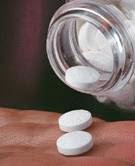Taking an aspirin a day can help prevent heart attack and stroke in people who have suffered such health crises in the past, but not in people who have never had heart problems, according to the U.S. Food and Drug Administration.
 "Since the 1990s, clinical data have shown that in people who have experienced a heart attack, stroke or who have a disease of the blood vessels in the heart, a daily low dose of aspirin can help prevent a reoccurrence," Dr. Robert Temple, deputy director for clinical science at the FDA, said in an agency news release.
"Since the 1990s, clinical data have shown that in people who have experienced a heart attack, stroke or who have a disease of the blood vessels in the heart, a daily low dose of aspirin can help prevent a reoccurrence," Dr. Robert Temple, deputy director for clinical science at the FDA, said in an agency news release.
A low-dose tablet contains 80 milligrams (mg) of aspirin, compared with 325 mg in a regular strength tablet.
However, an analysis of data from major studies does not support the use of aspirin as a preventive medicine in people who have not had a heart attack, stroke or heart problems. In these people, aspirin provides no benefits and puts them at risk for side effects such as dangerous bleeding in the brain or stomach, the FDA said.
by Robert Priedt, WebMD | Read more:
 "Since the 1990s, clinical data have shown that in people who have experienced a heart attack, stroke or who have a disease of the blood vessels in the heart, a daily low dose of aspirin can help prevent a reoccurrence," Dr. Robert Temple, deputy director for clinical science at the FDA, said in an agency news release.
"Since the 1990s, clinical data have shown that in people who have experienced a heart attack, stroke or who have a disease of the blood vessels in the heart, a daily low dose of aspirin can help prevent a reoccurrence," Dr. Robert Temple, deputy director for clinical science at the FDA, said in an agency news release.A low-dose tablet contains 80 milligrams (mg) of aspirin, compared with 325 mg in a regular strength tablet.
However, an analysis of data from major studies does not support the use of aspirin as a preventive medicine in people who have not had a heart attack, stroke or heart problems. In these people, aspirin provides no benefits and puts them at risk for side effects such as dangerous bleeding in the brain or stomach, the FDA said.
by Robert Priedt, WebMD | Read more:
Image: uncredited